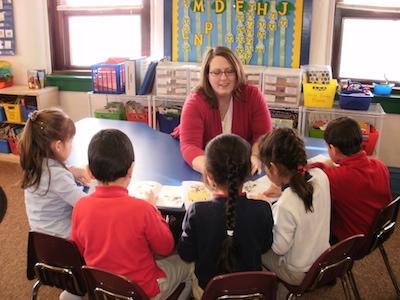When Jenni Crain looks back on her year of study in ACE's English as a New Language (ENL) program, she is reminded of the feeling of looking out her classroom window and seeing the house where her grandparents lived.
Crain teaches first grade at St. Adalbert Catholic School in South Bend, Ind., a school vibrant with the energy of growing Latino enrollment. When the parish and school were founded in 1910, though, this part of town housed many of the new Polish immigrants. Her mother and grandfather both went to the school, supported in the challenge of learning a language that was foreign to her grandfather.
"It's a completely different culture and nationality today, but it's kind of the same story," Crain recalls. "One hundred and four years later, parents are still scraping together pennies to support their ENL students on the west side of South Bend."
Catholic schools' ongoing legacy of welcoming and enriching newcomers gives Crain not only a sense of accomplishment spanning her ten years at St. Adalbert, but also a sense of solidarity with ACE's strong spirit of community. That's what she experienced in 2010-2011 as a member of the ENL cohort, combining coursework with uninterrupted teaching careers. She and educators from around the country prepared for licensure in key language pedagogy skills—an experience she now would recommend "absolutely, a hundred times over."
These ENL participants faced their own concerns and challenges of adjustment as they began the program, Crain recalls. She was worried about being able to afford the program on a teacher's salary. She wondered if she could manage extra academics amid the schooldays at St. Adalbert when teachers "wear a lot of hats"—supervising students' extracurricular activities, for example.
Crain found that the ACE team at the helm of the program, her ENL classmates, and her principal and colleagues at St. Adalbert all came together to encourage her and to make everything possible.
"I couldn't come up with a worry that the ENL leaders couldn't answer," she says. "There wasn't any situation they weren't willing to work with me on."
The Catholic school educators who gathered on campus to enter the program in summer 2010 soon realized they shared experiences in common and formed a mutually supportive community.
As Jenni's venue for the curriculum moved back to St. Adalbert in the fall and spring, the school community showed strong support, too. Cooperation and schedule adjustments made the studies doable, Crain says. Moreover, many ENL assignments involved activities in the classroom, "so, rather than creating a ton more work for a busy teacher, the coursework helped me to better focus the work I was already doing."
ACE's approach, unlike a conventional collegiate program, is planned with the classroom teacher's schedule in mind.
That design advantage goes even deeper, Crain says.
"It was clear from the day we arrived that Christ was the reason for the program; better serving his children was the goal. Even on the tough days, that keeps you moving in the right direction."
Crain says she's enjoyed the program's benefits year after year. Ideas and insights she learned proved applicable right away and ever since.
She had enrolled with ACE not only to benefit the students who needed the most ENL help, but also to avoid shortchanging those in her class with lesser language needs who still deserved her time and attention. Equipped with efficient and effective techniques and with know-how broadly suited for teaching languages, Crain discovered that "better serving my lowest learners was what was best for all of my kids."
The ENL program has made her classroom a better reflection of the Catholic legacy that transcends time and societal change, just as St. Adalbert School has done between 1910 and 2015, and now into the future.
"I have a lot more confidence with the cultural aspects of my job," Crain says. "My classroom is much more inclusive of different learning styles. Overall, the bar has been raised—both for me and my kids."

